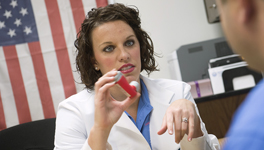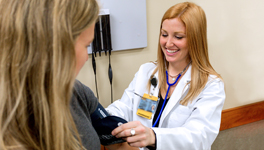
12/10/2020
Rachel Bishop
Why I do what I do:
I love that pharmacy and healthcare, in general, are ever-changing. It is impossible to know everything and I love that I can continue to learn new things even after 20 years in the field.
Latest Accomplishment:
I am very pleased that have been continuing to learn about the 340B program and expanding my knowledge beyond my desk. I am also very happy that I finally got through all 150 employee file audits I complete yearly! I am also very proud of my involvement in the pharmacy providing birthday gifts to our local foster children.
Most Memorable Experience as a Pharmacy Technician:
Honestly, it was a mistake I made as an IV technician. I made a magnesium drip wrong and the pharmacist made me go down to the floor and tell the nurse that I had made it wrong and to take it back. I will never forget that moment and it made me more aware and diligent in any activity I performed thereafter.
Why I Became Certified?
I wanted to be the best in my field and taking the extra step to become certified when it wasn’t required hopefully showed my dedication as a technician.
My Passion Outside of Work:
I enjoy reading, gardening, remodeling/redecorating my home, and teaching my youngest son baseball. I also want to raise more awareness about the children in foster care and hope to become a Court Appointed Special Advocate (CASA) soon.
Latest Book Read:
A Child Called “It” by Dave Pelzer.
Advice to Up-and-Coming Technicians:
Never stop learning. You may feel like all you do is count pills or fill an automated medication system. But, take the time to learn about what you are filling. It gives you a better understanding of the patient’s needs and helps you to have more compassion. Although we may not be involved in direct patient care, technicians are very much needed and pharmacies could not operate without us.

Ambulatory Care Practitioner
Improving patient care and health outcomes in ambulatory care settings

Section of Ambulatory Care Practitioners
Professional group for ASHP members working in ambulatory care settings


